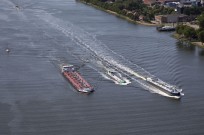The Mayor and Aldermen and, being mandated thereto, the Director Central Nautical Management North Sea Canal Area, is, on the ground of the Regional Port Bye-laws for the North Sea Canal Area 2019, authorised to designate public berths for tankers; this includes the authority to designate public berths for the purpose of the activities to be carried out at these berths.
-

Alexander Kousbroek has been appointed Port of Amsterdam’s new Chief Financial Officer (CFO) effective 1 January 2021. He will be succeeding Michiel de Brauw, who is resigning from his position on 31 December 2020.
The Director of the Central Nautical Management North Sea Canal Area announces the following:
The Director of the Central Nautical Management North Sea Canal Area announces the following.
Having regard to:
I.-

A ban on degassing of benzene and of cargo containing benzene during sailing will apply in North Holland with effect from 1 March 2017. The Executive of North Holland approved the amendment of the provincial environmental regulations on 20 December, to contribute to cleaner inland navigation.
On this page you will find all decrees that contain additional rules concerning harbour basins, locks and waterways.
BAOR = Operational Area of Berth Designation Decrees Operational Area (only available in Dutch)
< Back to all announcements
On this page you will find all announcements to shipping IJmond - North Sea Canal area (Basijnen)
< Back to all announcements
You won't miss anything from Port of Amsterdam anymore.
To establish the following additional sign for a seagoing vessel during the bunkering activity of the designated fuels and energy carriers listed below:
1. between sunset and sunrise: a bright, all-round red shining light and
2. between sunrise and sunset: the international signal flag "B".
During (de)bunkering methane, methanol and hydrogen, requirements must be imposed on other port users and passing ships to keep them at a safe distance from these operations. These requirements reduce the risk of collision and ensure that passing ships do not pose a source of ignition in the event of leakage - although such leakage has a very low probability of occurring.